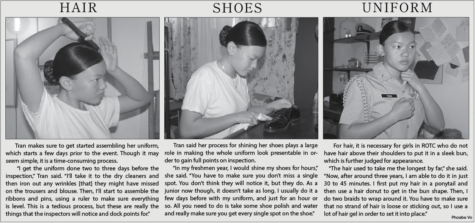In-depth: NJROTC military inspection
March 17, 2023
Mia Tran (11) scrambled to retrieve her phone after being woken up at seemingly the dead of night by her blaring alarm, March 8. The sky was still pitch black outside and her illuminating phone screen was the only source of light in the room. Tran turned off her alarm and checked the time: 4:30 a.m.
Tran had already become quite accustomed to waking up at such times due to NJROTC’s monthly inspections, but this morning was a little different.
“The Annual Military Inspection, or Area Managers Inspection, takes place once each year,” Tran said. “It is quite similar to our monthly inspections and the process is almost exactly the same, where we are lined up, asked questions about ROTC-related things, and get our uniforms inspected. But, for this event, the area manager, Commander Garcia, or an SNSI [Senior Naval Science Instructor], from another school will come to evaluate us individually and as a unit. This year it is an SNSI.”
Tran said that ROTC’s unit preparation usually starts a couple of weeks before the inspection. She describes their process.
“We want to make sure that everyone is prepared,” Tran said. “We have to practice our formations as well, making sure each cadet is able to walk properly and perform smooth transitions along with the rest of the unit. The Area Manager’s Inspection also includes a ceremony afterward, where we perform marches, so we have to make sure we are ready for that too.”
Tran also said that they want to make sure that each cadet understands the content they need to know, as the inspector can ask any questions within the large range of military topics they study.
“They’ll ask you questions on ranks in the military, the Navy and Marine Corps, and you also have to know who is holding positions nationally military-wise, like ‘Who’s the Secretary of Defense?’” Tran said. “Or, they ask you things about male and female regulations for appearance, like ‘How long can fingernails be for females?’ or ‘What is the policy on bracelets?’ We have to make sure each cadet is confident in their answer because even if you get it right, the inspector might challenge you still. Everyone’s individual performance reflects the entire unit at Westview, so we have to make sure we are in tip-top shape.”
Being able to answer questions confidently and correctly is just one part of the inspection process, Tran said. The uniform and appearance are a large part of the unit’s evaluation also.
Therefore, even having done much of the preparation for her uniform and shoes beforehand, Tran still needs to wake up between 4 and 4:30 a.m. in order to prepare her hair and last-minute details to be on time at 6:45 a.m., the event start time.
“Those little details are really important,” Tran said. “I can’t afford to have one hair strand out, a single wrinkle on my uniform, a pin unaligned, or a spot on my shoes that is not shined.”
Once Tran makes sure her appearance is nothing less than perfect, she makes her way to school, where all her hard work will pay off during the inspection process. Each ROTC period gets called in, one at a time.
Captain Thomas Adams, the head of ROTC at Westview, said that the Area Manager’s Inspection is very important for the cadets.
“With an external party coming in that doesn’t know them, they get to see whether these cadets do, in fact, know how to properly prepare their uniforms from head to toe and whether or not they possess the requisite knowledge,” Adams said. “They also have to demonstrate that they have proper bearing and composure when they are under pressure in front of, basically, a stranger. If you put in the time and effort, you will achieve good results.”
Adams elaborates on the precision that inspection requires, saying how it is necessary to foster an environment similar to the actual military.
“In the military, meticulous attention to details is an essential skill,” Adams said. “It helps ensure our forces are properly equipped and prepared for the situations they may encounter while in combat. To simulate the degree of preparedness required in the actual military, we have cadets practice and prepare on requisite JROTC knowledge, uniform preparation and adherence to published grooming standards. It is also a life skills lesson: proactive planning and preparation for challenges at school, work or in everyday life.”
Adams said the specific grading scale for inspection ranges from best to worst: Outstanding, Excellent, Good, Satisfactory, and Unsatisfactory. Adams added that cadets can win certain awards by performing well.
“The Exemplary Personnel Appearance (EPA) award is only given out once a year at the ceremony after Area Manager’s Inspection,” Adams said. “Cadets only get this if they get a grade of ‘Outstanding’ on their individual inspection.”
The ceremony after the inspection, which takes place at the football field, is also an essential part of the event overall. Not only do they give out the EPA to ‘Outstanding’ cadets, but they also perform a series of formations and sequences that reflects the unit’s cohesiveness and preparation.
“We have to make sure that everyone knows where to be and what they are doing,” Tran said. “This is why it takes weeks in preparation to practice beforehand. We have to make sure not a single person is out of line during each part: marching towards the football fields, getting into position, standing still while awards are being announced, and during the actual performance itself.” Adams said that it is every individual cadet’s responsibility to be in line with the rest.
“It’s not just the person who normally is in charge of the platoon giving the commands who has to perform well,” Adams said. “No one should be in the position where they do not know what they are doing. Every single person, no matter [if] they were a brand new cadet or extremely experienced, has to know how to do the whole sequence.”
Overall, the event marks an important date for ROTC cadets, showing them how they have progressed throughout the year as individuals, whether it be for those in high leadership positions or a cadet just starting out, and as a whole Westview unit.
“The main focus is [answering], ‘How are your cadets doing?’” Adams said. “In this annual inspection, we get a chance to have an external party answer that question as far as their core knowledge, their self-confidence, and their abilities. This is the main reason we do it every year.”



